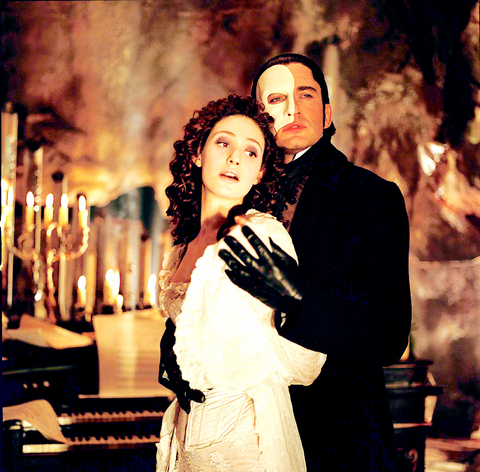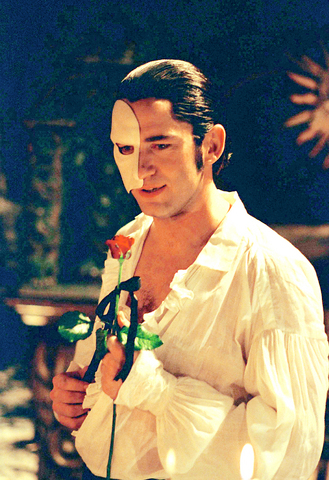"There are too many notes for my taste," sniffs one of the proprietors of the Opera Populaire in The Phantom of the Opera.
I quite agree. He is talking about the threatening messages that the control-freak phantom (Gerard Butler) is sending to various members of the company, but his complaint applies perfectly to the music of Andrew Lloyd Webber, whose relentless bombast afflicts this movie like a bad case of swollen lymph nodes.

PHOTO COURTESY OF FOX MOVIES
Of course, Lord Lloyd Webber's music is the whole point of the film, and Joel Schumacher, the director, does his best to find a visual style to match the vulgarity and pretentiousness of the soundtrack. He succeeds admirably, drawing on his long-ago experience designing department-store window displays to produce nearly two-and-a-half hours' worth of overstuffed tableaux, the cumulative effect of which is likely to be a state of headachy nervous exhaustion. This kind of spectacle might work onstage, where numb enervation can sometimes be mistaken for exhilaration, but this screen version, for all its wailing emotionalism and elaborate production design, lacks both authentic romance and the thrill of memorable spectacle.

These failings are not the fault of the cast, which works hard to capture the grand, delicate feelings of this venerable, much-adapted story. Somewhere in this movie is the story of a striving young singer, a tormented musical genius and the volatile mixture of artistic ambition and obsessive longing that binds them together, but it is buried in orchestral sludge and chaotic storytelling.
Lord Lloyd Webber's thorough acquaintance with the canon of 18th and 19th-century classical music is not in doubt, but his attempt to force a marriage between that tradition and modern musical theater represents a victory of pseudo-populist grandiosity over taste -- an act of cultural butchery akin to turning an aviary of graceful swans and brilliant peacocks into an order of Chicken McNuggets. The songs fill your ears, but you are unlikely to find yourself humming any of them after the movie is over (which may, come to think of it, be the only merciful thing about this Phantom.)

PHOTO COURTESY OF FOX MOVIES
Nonetheless, the music is technically demanding -- just try to hum a few bars -- and calls forth some impressive singing, especially from Butler and from the lovely Emmy Rossum, who plays his protagonist, Christine Daae. Rossum, who was the murdered daughter in Clint Eastwood's Mystic River, breathes some fresh air into her claustrophobic, overupholstered surroundings and brings both a spark of defiance and a touch of melancholy to her role. Butler has sufficient physical and vocal presence to give the phantom some dramatic weight, though the same cannot be said for Patrick Wilson, who plays the phantom's rival (and Christine's childhood sweetheart), the smooth-faced Vicomte Raoul de Chigny. Although everyone in the movie is supposed to be French, only Miranda Richardson, as the head of the corps de ballet, attempts a French accent.
Minnie Driver, as the Italian diva upstaged by Christine and the Phantom, tries a bit of dialect humor, saying things like " `Ee lava me!" and "I 'ate my 'at!" as if she were auditioning for a part in the next Super Mario video game. This passes for comic relief in a film otherwise notable for its witlessness. Full though it is of bellowings and screechings about love, art and the spirit of music, The Phantom of the Opera is remarkably lacking in tenderness or grace. The gothic creepiness that has kept Gaston Leroux's 1910 novel in circulation for so long has also been swept away. There are dark corridors, guttering candles, masks, robes, corsets and top hats, but no sense of mystery or strangeness.
For that, I suppose, you will have to go back to Rupert Julian's 1925 version, which starred Lon Chaney as the phantom. That film, long regarded as a classic, has a great many virtues, two of which seem especially relevant at the moment: it is 93 minutes long, and it is silent.

May 18 to May 24 Pastor Yang Hsu’s (楊煦) congregation was shocked upon seeing the land he chose to build his orphanage. It was surrounded by mountains on three sides, and the only way to access it was to cross a river by foot. The soil was poor due to runoff, and large rocks strewn across the plot prevented much from growing. In addition, there was no running water or electricity. But it was all Yang could afford. He and his Indigenous Atayal wife Lin Feng-ying (林鳳英) had already been caring for 24 orphans in their home, and they were in

On May 2, Chinese Nationalist Party (KMT) Chairman Eric Chu (朱立倫), at a meeting in support of Taipei city councilors at party headquarters, compared President William Lai (賴清德) to Hitler. Chu claimed that unlike any other democracy worldwide in history, no other leader was rooting out opposing parties like Lai and the Democratic Progressive Party (DPP). That his statements are wildly inaccurate was not the point. It was a rallying cry, not a history lesson. This was intentional to provoke the international diplomatic community into a response, which was promptly provided. Both the German and Israeli offices issued statements on Facebook

Even by the standards of Ukraine’s International Legion, which comprises volunteers from over 55 countries, Han has an unusual backstory. Born in Taichung, he grew up in Costa Rica — then one of Taiwan’s diplomatic allies — where a relative worked for the embassy. After attending an American international high school in San Jose, Costa Rica’s capital, Han — who prefers to use only his given name for OPSEC (operations security) reasons — moved to the US in his teens. He attended Penn State University before returning to Taiwan to work in the semiconductor industry in Kaohsiung, where he

Australia’s ABC last week published a piece on the recall campaign. The article emphasized the divisions in Taiwanese society and blamed the recall for worsening them. It quotes a supporter of the Taiwan People’s Party (TPP) as saying “I’m 43 years old, born and raised here, and I’ve never seen the country this divided in my entire life.” Apparently, as an adult, she slept through the post-election violence in 2000 and 2004 by the Chinese Nationalist Party (KMT), the veiled coup threats by the military when Chen Shui-bian (陳水扁) became president, the 2006 Red Shirt protests against him ginned up by